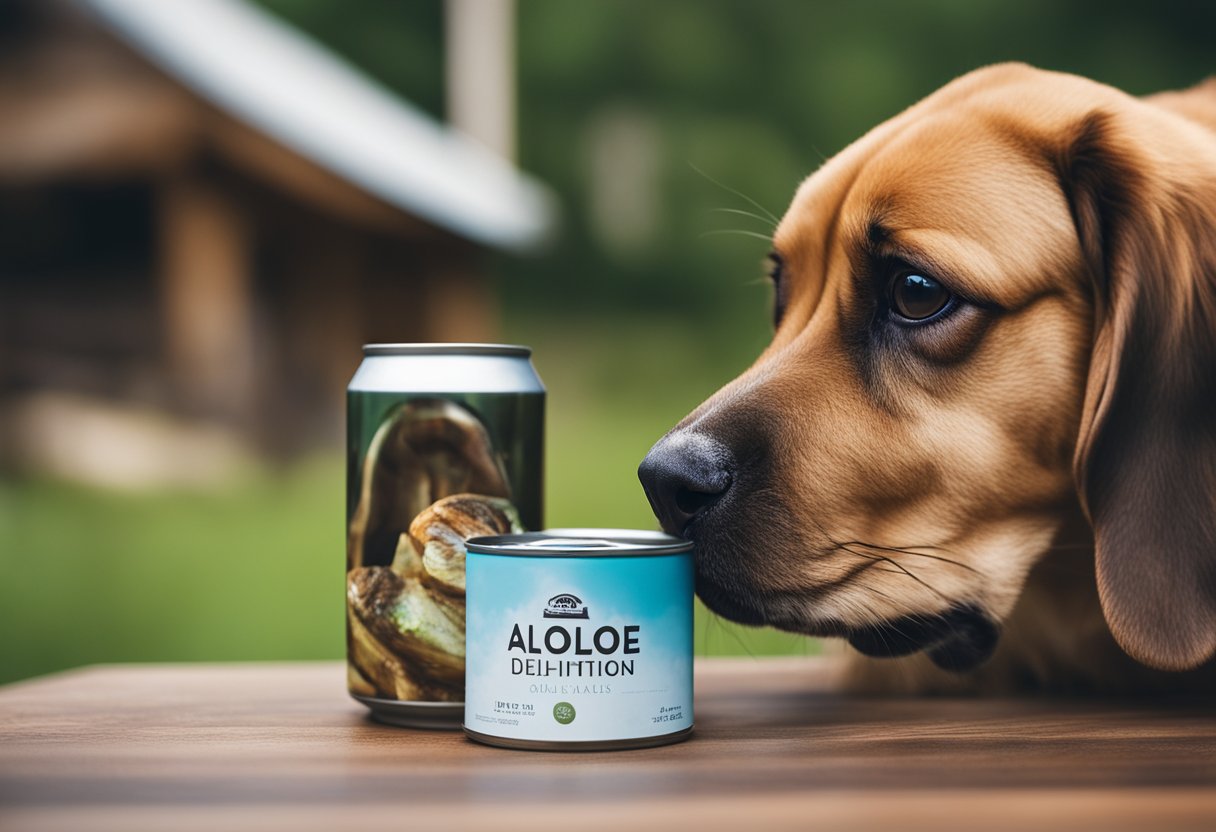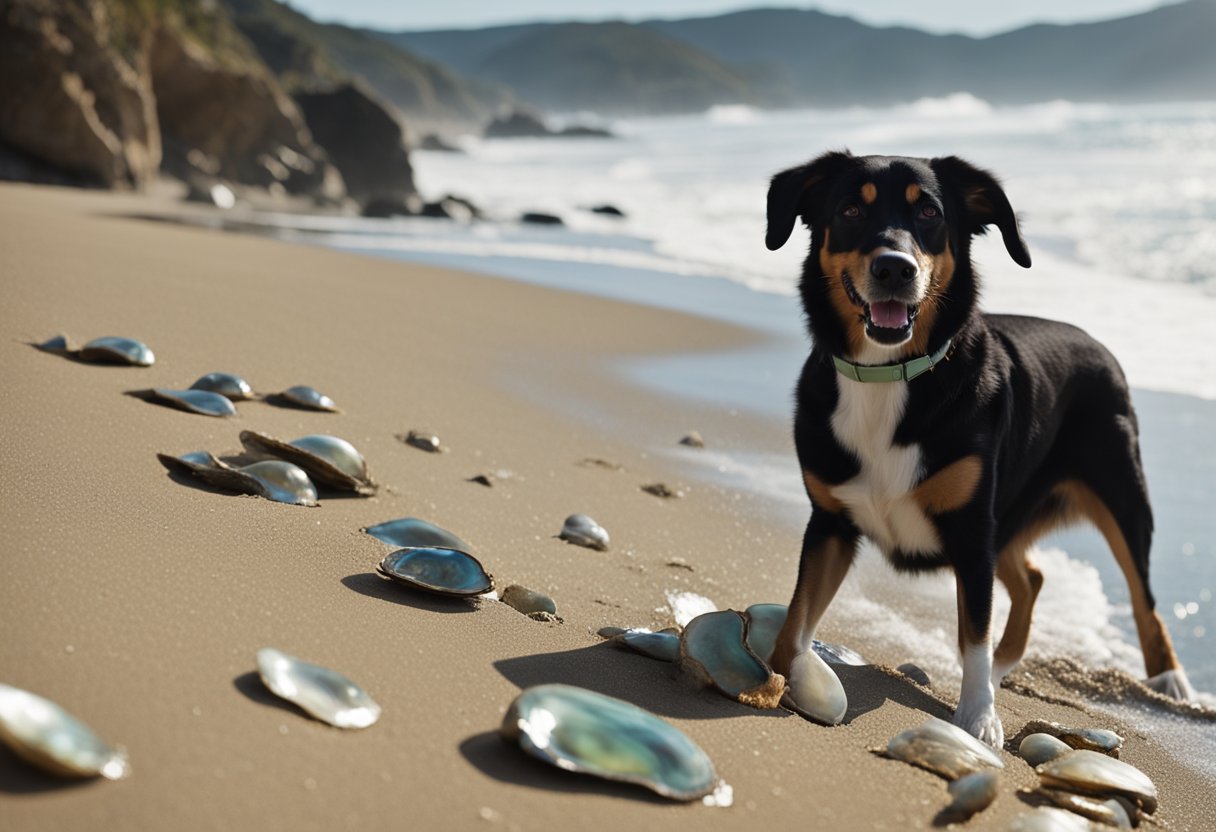As a dog owner, it’s natural to want to share your favorite foods with your furry friend. However, not all human foods are safe for dogs to eat. One such food is abalone, a type of shellfish that is considered a delicacy in many parts of the world. But can dogs eat abalone?

The short answer is no, dogs should not eat abalone. While abalone is not toxic to dogs, it can be difficult for them to digest. Abalone is high in protein and can cause digestive upset, including vomiting and diarrhea, if consumed in large quantities. Additionally, abalone shells are sharp and can cause injury to a dog’s mouth or digestive tract if ingested.
It’s important to remember that dogs have different nutritional needs than humans, and what may be safe for us to eat may not be safe for our furry friends. As a responsible pet owner, it’s always best to stick to a balanced diet of dog food and treats that are specifically formulated for dogs. If you’re ever unsure about whether a certain food is safe for your dog to eat, it’s best to consult with your veterinarian.
What Is Abalone

Abalone is a type of mollusk that belongs to the mollusk family. It is a marine snail that has a flattened shell with a spiral structure. Abalone is considered a delicacy and is enjoyed in many cuisines, including Japanese and Chinese.
Abalone is an edible mollusk that is highly prized for its unique taste and texture. It is often served raw or cooked in a variety of dishes, including soups, stews, and stir-fries. Abalone is also commonly used in sushi and sashimi dishes.
The flavor of abalone is often described as sweet and slightly salty, with a buttery texture that melts in your mouth. It is a rich source of protein and is low in fat, making it a healthy addition to any diet.
In addition to being a popular food, abalone is also used in traditional Chinese medicine for its healing properties. It is believed to help improve digestion, boost the immune system, and promote overall health and well-being.
Overall, abalone is a unique and delicious delicacy that is enjoyed by many around the world. Whether you are a fan of Japanese or Chinese cuisine or simply looking for a new and exciting food to try, abalone is definitely worth a taste.
Nutritional Value of Abalone
https://www.youtube.com/watch?v=sv3g7pLJQHY&embed=true
As a dog owner, you might be wondering about the nutritional value of abalone and if it’s safe for your furry friend to consume. Abalone is a type of shellfish that is highly valued for its nutritional content. It is rich in protein, calcium, copper, omega-3, potassium, iodine, and antioxidants.
Abalone is an excellent source of protein, which is essential for building and repairing tissues in the body. Protein is also important for maintaining healthy skin, fur, and nails in dogs. A 100-gram serving of abalone contains around 17 grams of protein, making it a great source of this essential nutrient.
Calcium is another important nutrient found in abalone. Calcium is essential for strong bones and teeth in dogs. A 100-gram serving of abalone contains around 30 milligrams of calcium, which is a good amount for your dog’s daily needs.
Copper is a mineral that is essential for the formation of red blood cells in dogs. It also helps with the absorption of iron, which is important for preventing anemia. Abalone is an excellent source of copper, with a 100-gram serving containing around 2 milligrams.
Abalone is also rich in omega-3 fatty acids, which are important for maintaining a healthy coat and skin in dogs. Omega-3s also have anti-inflammatory properties, which can help reduce joint pain and inflammation in dogs with arthritis.
Potassium is another important nutrient found in abalone. It helps regulate fluid balance in the body and is important for maintaining healthy blood pressure levels. A 100-gram serving of abalone contains around 250 milligrams of potassium.
Iodine is a mineral that is essential for thyroid function in dogs. The thyroid gland produces hormones that regulate metabolism, growth, and development. Abalone is a good source of iodine, with a 100-gram serving containing around 30 micrograms.
Finally, abalone is also rich in antioxidants, which help protect the body against damage from free radicals. Free radicals are unstable molecules that can damage cells and contribute to the development of chronic diseases. Antioxidants help neutralize these harmful molecules and protect the body against their damaging effects.
In conclusion, abalone is a highly nutritious food that can provide many health benefits to your dog. However, it’s important to keep in mind that abalone should be consumed in moderation and as part of a balanced diet. If you’re unsure about whether abalone is safe for your dog to eat, it’s always best to consult with your veterinarian.
Can Dogs Eat Abalone
https://www.youtube.com/watch?v=ADiI-KD0dH4&embed=true
As a pet owner, you may be wondering if it is safe for your dog to eat abalone. Abalone is a type of shellfish that is often consumed by humans, but can dogs eat abalone?
The short answer is that it is not recommended for dogs to eat abalone. Abalone can be difficult for dogs to digest, and there is a risk that it could cause gastrointestinal upset, such as vomiting or diarrhea. Additionally, abalone can contain high levels of heavy metals, which can be harmful to dogs if consumed in large amounts.
If your dog has accidentally consumed a small amount of abalone, it is unlikely to cause any harm. However, if your dog has eaten a large amount of abalone, or if they are showing signs of illness after eating it, you should contact your veterinarian right away.
It is important to note that abalone is not a necessary part of a dog’s diet, and there are plenty of other foods that are safer and more appropriate for dogs to eat. If you are looking for a special treat for your dog, there are many dog-friendly foods that are both safe and healthy, such as lean meats, fruits, and vegetables.
In conclusion, while abalone may be a tasty treat for humans, it is not recommended for dogs. If you are unsure about whether a particular food is safe for your dog to eat, it is always best to consult with your veterinarian.
Potential Benefits of Abalone for Dogs
https://www.youtube.com/watch?v=fjd9LodnFPs&embed=true
As a dog owner, you may be wondering whether abalone is safe for your furry friend to eat. The good news is that abalone can be a nutritious addition to your dog’s diet and may offer several potential health benefits.
One of the main benefits of abalone is its high protein content. Protein is essential for dogs as it helps to build and repair tissues, support the immune system, and maintain healthy skin and fur. Abalone meat is particularly rich in protein, making it a great source of this essential nutrient for your dog.
In addition to protein, abalone also contains a range of other important nutrients that can benefit your dog’s health. For example, abalone is a good source of iodine, which is important for the function of the thyroid gland. It also contains omega-3 fatty acids, which can help to reduce inflammation and promote healthy joints.
Abalone may also have cancer prevention properties. Some studies have suggested that the bioactive molecules found in abalone may have antioxidant and anti-inflammatory effects, which could help to protect against cancer.
Finally, abalone may also help to reduce joint pain in dogs. This is because it contains glycosaminoglycans, which are compounds that are commonly used in joint supplements for dogs. These compounds can help to support joint health and reduce inflammation, which can help to alleviate joint pain and stiffness.
Overall, while abalone should not be the mainstay of your dog’s diet, it can be a nutritious and beneficial addition in moderation. As always, it’s important to consult with your veterinarian before making any changes to your dog’s diet to ensure that it is appropriate for their individual needs.
Potential Risks of Abalone for Dogs

As a dog owner, you may be wondering if it is safe to feed your furry friend abalone. While abalone is generally safe for human consumption, it may not be the best choice for dogs. In fact, feeding your dog raw abalone can be potentially dangerous, as it may contain toxins and bacteria that can cause food poisoning.
One of the biggest risks of feeding your dog abalone is the risk of choking. Abalone is a shellfish, and its hard, slippery shell can pose a choking hazard to dogs. Additionally, abalone can cause digestive issues such as vomiting and diarrhea, which can be unpleasant and uncomfortable for your dog.
Another potential risk of feeding your dog abalone is the risk of allergic reactions. Some dogs may be allergic to shellfish, which can cause a range of symptoms including itching, swelling, and difficulty breathing. If your dog has a history of allergies, it is best to avoid feeding them abalone.
In addition to the risks mentioned above, abalone may also contain high levels of mercury, which can be harmful to dogs in large quantities. Additionally, abalone may be contaminated with parasites, which can cause a range of health issues including liver and joint pain.
If you suspect that your dog has eaten abalone and is experiencing signs of toxicity, such as vomiting, diarrhea, lack of appetite, body weakness, or high body temperature, it is important to seek veterinary care immediately. In some cases, abalone poisoning can lead to more serious health issues such as intestinal blockage and even death.
In conclusion, while abalone may be a tasty treat for humans, it is best to avoid feeding it to your dog. If you do choose to feed your dog abalone, make sure it is cooked thoroughly and free of any shells or other contaminants. As always, it is important to monitor your dog’s health and seek veterinary care if you suspect they may be experiencing any health issues related to their diet.
How to Safely Feed Abalone to Dogs
As a dog owner, you may be wondering if abalone is safe for your furry friend to eat. The answer is yes, but with some important considerations.
Firstly, it is important to note that abalone should only be fed to dogs in moderation and as part of a balanced diet. While abalone meat is a good source of protein, it should not be the sole source of your dog’s nutrition. Consult with your veterinarian to determine the appropriate amount of abalone to feed your dog based on their breed, size, and dietary needs.
When feeding abalone to your dog, it is important to ensure that it is cooked thoroughly. Raw abalone can contain harmful bacteria and parasites that can be dangerous to your dog’s health. Cooked abalone is safe for dogs to eat and can be a healthy addition to their diet.
It is also important to remove the abalone from its shell before feeding it to your dog. The shell can be a choking hazard and can cause damage to your dog’s teeth and gums. Additionally, the hard shell can be difficult for your dog to digest and can cause gastrointestinal issues.
In addition to abalone meat, you can also incorporate other foods into your dog’s diet to provide a balanced and nutritious meal. Lean meats such as chicken and vegetables like carrots and green beans can be a healthy addition to your dog’s diet. You can also incorporate supplements and dog treats to ensure that your dog is receiving all the necessary nutrients.
In summary, abalone can be a safe and healthy addition to your dog’s diet when fed in moderation and cooked thoroughly. Always consult with your veterinarian to determine the appropriate amount of abalone to feed your dog and to ensure that their diet is balanced and meets their nutritional needs.
Alternatives to Abalone in Dog’s Diet
As a responsible pet owner, it is important to ensure that your dog receives a balanced and nutritious diet. While abalone may be a tasty treat for humans, it is not recommended as a regular part of a dog’s diet due to its high phosphorus content. Excessive phosphorus intake can lead to health problems such as joint pains and impaired thyroid function.
Fortunately, there are plenty of other options for providing your dog with a healthy and varied diet. Here are some alternatives to abalone that you can consider incorporating into your dog’s meals:
Meat
Meat is an excellent source of protein for dogs, and there are many different types to choose from. Chicken, beef, and lamb are all popular choices, but you can also consider more exotic meats such as bison or venison. When feeding your dog meat, it is important to ensure that it is cooked thoroughly and that any bones are removed to prevent choking hazards.
Seafood
If you’re looking for a seafood alternative to abalone, shrimp and crab are both good options. These shellfish are low in fat and high in protein, and they also contain important nutrients such as omega-3 fatty acids. However, it is important to ensure that the shrimp or crab is cooked and that any shells or legs are removed to prevent choking hazards.
Vegetables
Vegetables can be a great addition to your dog’s diet, providing important vitamins and minerals. Carrots and green beans are both good options, as they are low in calories and high in fiber. You can also consider incorporating other vegetables such as sweet potatoes or broccoli, but be sure to avoid feeding your dog any vegetables that are toxic to dogs, such as onions or garlic.
Dog Treats
In addition to their regular meals, many dogs enjoy receiving treats as a reward. There are plenty of healthy dog treats available that are low in fat and high in protein, such as freeze-dried liver or chicken jerky. However, it is important to be aware of any potential health risks associated with certain types of treats, such as the recent concerns over grain-free dog treats and their potential link to heart disease.
By incorporating a variety of different foods into your dog’s diet, you can help ensure that they receive all the nutrients they need for optimal health and wellbeing.
Conclusion
In conclusion, while abalone is safe for human consumption, it is not recommended for dogs. Dogs have different digestive systems than humans, and they may not be able to tolerate abalone. Abalone can cause digestive upset, including vomiting and diarrhea, in dogs.
If you suspect your dog has eaten abalone, it is essential to contact your vet immediately. Your vet can assess the situation and provide appropriate treatment, which may include inducing vomiting or providing supportive care.
As a responsible dog owner, it is essential to be aware of what foods are safe for your pet. While it may be tempting to share your favorite foods with your furry friend, it is crucial to remember that some foods can be harmful or even deadly to dogs.
In summary, while abalone may be a delicacy for humans, it is not a suitable food for dogs. If you have any concerns about your dog’s diet or health, it is always best to consult with a veterinarian.






